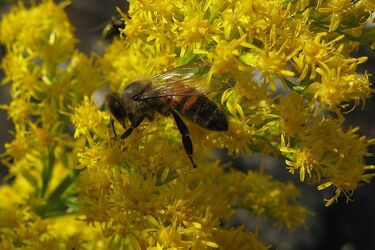Scientists have found the first plant with signs of intelligence

Scientists from Cornell University, environmental chemist Andre Kessler, together with his doctoral student Michael Mueller, have for the first time recorded signs of intelligence in plant behavior.
Studies show that under certain challenges, plants are able to be active and adapt to changes in the environment using a kind of cognitive function, including memory and decision-making. This is reported by Science Alert.
These features were discovered in a plant that resembles a weed, known as the highest goldenrod (Solidago altissima). In the course of the study, scientists found that this plant can "hear cries" from neighboring plants that are suffering from attacks by hungry herbivores.
So, when leaf beetle larvae attack the leaves of goldenrod, it produces volatile organic compounds (VOCs) that warn insects that the plant is damaged and they should look for another place to eat.
In addition, damaged plants can change the red reflectance spectrum of their leaves, making them visible to other plants at a certain distance.
"Depending on the information it receives from the environment, the plant changes its standard behavior," Kessler said.
In the event of a potential threat, plants are able not only to strengthen their stems to protect themselves from predators, but also to accelerate growth and synthesize defensive substances to resist insects, which resembles the action of immunity in animals.
"They can recognize their environment very accurately; as far as we know, every cell can do this," Kessler emphasized.
Scientists believe that the plant response to stress signals is not a simple reflex or pre-established behavior, but rather a smart adaptation to the loss of resources due to herbivores and competition with other plants.
"Given this definition and the accumulated evidence, the question is not whether plants exhibit intelligent behavior, but how they achieve this without a nervous system and what are the ecological consequences of such behavior," Kessler and Mueller summarized.
If you want to get the latest news about the war and events in Ukraine, subscribe to our Telegram channel!
